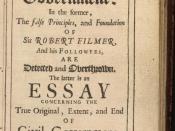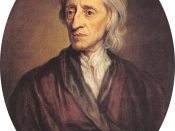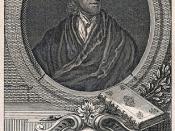The seventeenth century was a difficult time in England. Intense intellectual ferment surged out of the Enlightenment, a turning point in history that ushered in the contemporary age. Ripple effects from previous, bloody religious reforms threatened further persecution, fanaticism, and death between Protestants, Catholics, and Puritans. After the reigns of absolute monarchs James II and Charles I, the public broke out in civil war and overthrew the monarchy. However, an inexperienced republic would not last and soon Charles II was invited to take the throne, restoring the monarchy. Even family life was disrupted. Husbands and sons rode off into battle, where they were usually killed. Only mothers and children were left to defend their own homes. A cascade of condemnation erupted from the public, forced to live a life of fear. By far, the most revolutionary critiques came from the pen of an enlightened philosopher. During the seventeenth century, John Locke had the greatest influence on the formation of liberalism, human rights, and democratic government, all of which still exist today.
John Locke was born August 29, 1632 in Wrington, Somerset, England. His mother died during his infancy, so his father, an attorney, raised him. Locke was tutored at home because of the outbreak of civil war in 1642. Beginning at the age of 14, he attended Westminster School for six years. Then he was admitted to Christ Church, Oxford. In 1658, he was elected a senior student at the college, where he was taught Greek and moral philosophy. After a few years, he switched into the faculty of medicine. Eventually, in 1668, he became a member of the Royal Society, an "independent scientific academy of Great Britain dedicated to promoting excellence in science." (Honderich, 493)
Locke had many prominent friends who were nobles in government. In 1672, the first...



John Locke
A very detailed and resourceful essay about one of the earlier philosophers. I've just completed certain aspects of the Enlightenment at school, and your essay adds more information to my mind. Excellent.
3 out of 3 people found this comment useful.